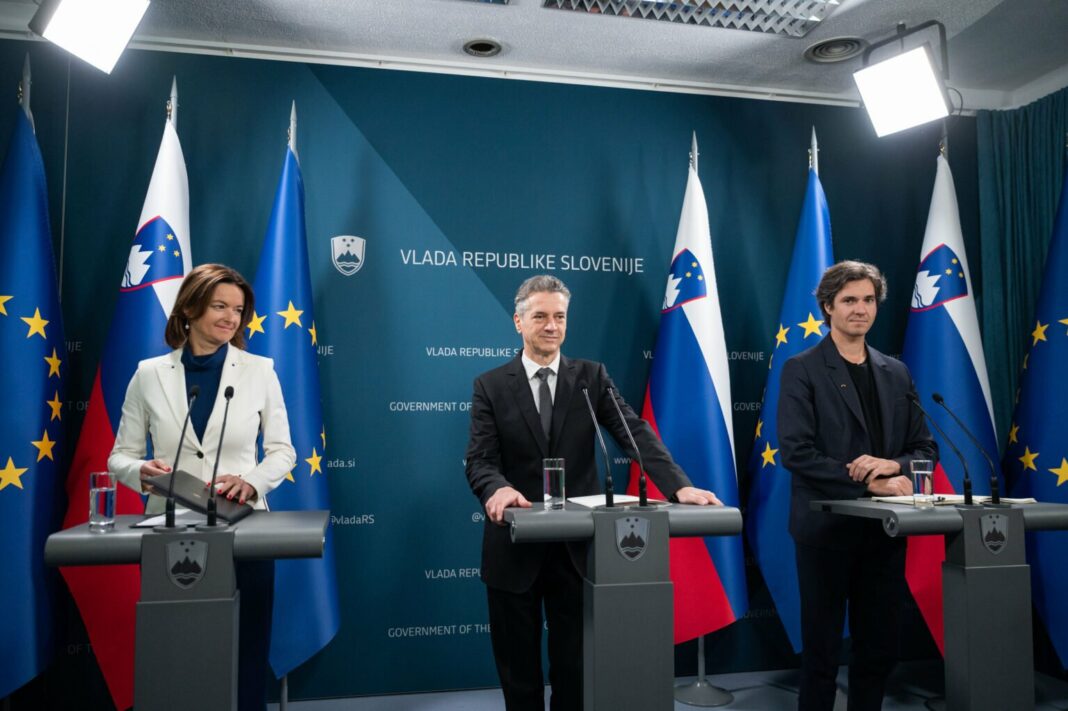By: Domen Mezeg (Nova24TV.si)
The government has adopted four emergency laws, along with a basket of promises. But where will the money come from? We will contribute it! The economy will also contribute – Golob is quietly hinting at the nationalisation of bank and insurance company assets.
The government has passed a proposal for an emergency law to aid flood relief, which plans for the urgent restoration of infrastructure and assistance to the most affected. However, the restoration will not be paid for by the government. Taxpayers will pay the bill.
The government has divided the assistance into four categories.
The first category is for assistance to individuals or households, the second category consists of measures for businesses, i.e., the economy, the third category includes measures specifically designed for municipalities. The fourth category of measures encompasses restoration and preventive actions on public infrastructure, watercourses, and flood protection.
The government will seemingly be setting up new bureaucratic bodies as if by routine. Among the measures for municipalities, Minister Ajanović Hojnik emphasised the establishment of technical offices that will be organised within the government service and will provide assistance or advice for projects. They also envision the creation of a fund for the restoration of Slovenia, aimed at co-financing comprehensive measures and projects related to floods and landslides. “It will collect funds from the state budget, European funds, and other sources,” explained the Minister of Public Administration, adding that the operational details of the fund will be determined by the government through a separate law within two months.
All emergency measures will be in effect until December 31st of this year, while measures facilitating easier employment for foreigners will remain effective until August 31st, 2023.
The Minister also added that the measures will be designed to consider the “reality of climate change”, whatever that may entail. As stated by the Minister of Labour, Family, Social Affairs, and Equal Opportunities, Luka Mesec, the government has also envisaged a mandatory solidarity contribution, which will flow into the fund for the restoration of Slovenia. As emphasised, everyone will contribute – employees will pay a portion from their income tax, and the same amount will also be contributed by the economy.
The contribution will be paid in the years 2023 and 2024, and it will be calculated by the tax authority (Furs) alongside the income tax. “We are talking about approximately 0.3 percent of income tax,” explained Mesec, and he added that the final amount will be announced by the ministry by the end of the day.
“An alternative to the mandatory contribution is the solidarity Saturday, where, with the agreement of employees and companies, it will be possible to replace this mandatory contribution with work, and the income of that day will be directed to the fund for the restoration of Slovenia,” explained Minister Ajanović Hovnik. However, according to Mesec’s announcements, in order to be exempt from paying the mandatory solidarity contribution, one will need to work one Saturday this year and one in the next.
Golob threatened banks and insurance companies
Recall that Golob recently threatened banks and insurance companies. “Today, the banks have 48 hours. Tomorrow, you will have 48 hours. History is a teacher,” commentator Iršič wrote alongside Golob’s 48-hour ultimatum to banks to decide how to help people after the floods. And if they do not do that, will there be forced confiscation of property?
The government of Robert Golob is truly leading us back into a socialist dictatorship. Media reports indicate that Golob has given banks exactly 48 hours to decide how to help people concretely. And what will happen if they do not? Will forced nationalisation follow? Will ordinary, honest citizens who have worked hard for their second car, weekend house, and savings in the bank suddenly lose everything? Should retirees fear for their dental gold if they have nothing left in their accounts?
Will forced privatisation follow, as was the case with the wealthy Hribar couple? In 1944, despite their material and other assistance to the partisans, they were declared national traitors by the VOS (the communist secret police), tortured (quartered), and brutally murdered. Subsequently, the communist party confiscated their immense wealth. Let us recall that Rado Hribar owned Strmol Castle, was an industrialist, banker, art collector, and such individuals were the target of envy from the work-averse communists. Will history repeat itself?

